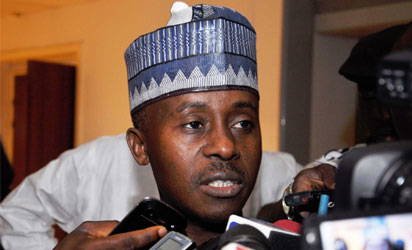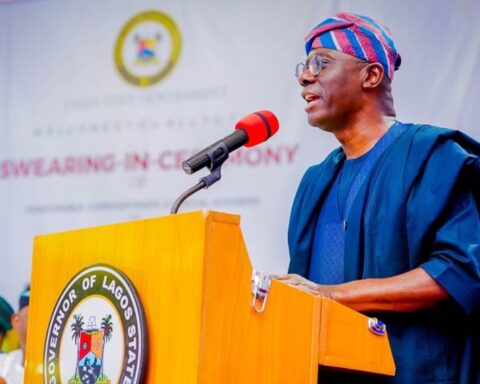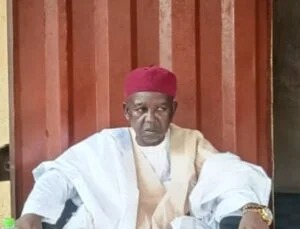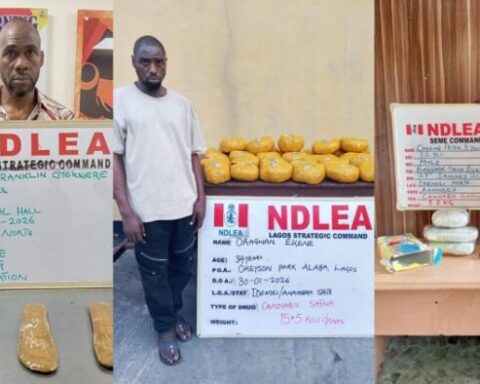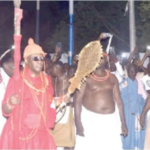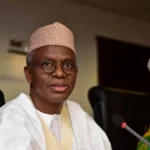By ADEMOLA TIJANI
Hon. Farouk Lawal, once a prominent member of the Nigerian House of Representatives, representing Bagwai/Shanono Federal Constituency in Kano State.
In 2007, as one of the active member of the house,Hon. Farouk Lawan led a group of lawmakers known as the Integrity Group, which played a pivotal role in the removal of Hon. Patricia Olubunmi Etteh from her position as the Speaker of the Nigerian House of Representatives. The Integrity Group, comprising over 50 members of the House, was a reformist faction that championed transparency and accountability within the legislature. Their stance against perceived corruption and abuse of office ultimately led to the first removal of a Speaker in Nigeria’s history.
The controversy that resulted in Etteh’s ousting centered on allegations of financial misappropriation. Shortly after her election as Speaker in 2007, Etteh faced accusations of approving ₦628 million for the renovation of her official residence and the purchase of 12 official cars for principal officers. The amount was seen as exorbitant and sparked a wave of criticism both inside and outside the House.
Lawan’s Integrity Group took the lead in challenging the legitimacy of Etteh’s actions. The group accused her of approving the budget without following due process and sought her resignation on grounds of corruption and misconduct. They argued that such large sums being spent on renovations and vehicles at a time when Nigeria was grappling with widespread poverty and underdevelopment was inappropriate and a misuse of public funds.
Lawal, respected at the time for his stance on transparency and reform, became the face of the opposition to Etteh’s leadership. The Integrity Group held several press conferences and staged protests within the National Assembly, calling for investigations into the scandal and insisting that Etteh step down.
Amid the growing pressure and internal divisions within the House, an investigative panel was set up to look into the allegations. Although the panel did not directly implicate Etteh in personal wrongdoing, the overwhelming negative perception and the intensity of the protests from the Integrity Group and other members made her position untenable.
On October 30, 2007, Patricia Etteh resigned as Speaker, a move that marked a significant victory for Farouk Lawal and his group. Etteh’s resignation sent a strong message about accountability, signaling that the Speaker’s position, once seen as immune to scrutiny, could be challenged.
The Integrity Group became known as a moral force within the House of Representatives, gaining considerable influence following their success. Farouk Lawal’s role in leading the movement bolstered his reputation as a reformist, a lawmaker committed to integrity and the fight against corruption. However, years later, his involvement in the 2012 fuel subsidy bribery scandal would ironically tarnish the very reputation for integrity that had defined his political career during the Etteh saga.
Etteh’s removal remains a landmark event in Nigeria’s political history, as it demonstrated the power of internal dissent and the potential for reform within the legislature. Farouk Lawal’s leadership of the Integrity Group was a key factor in this outcome, exemplifying the role of political advocacy in holding powerful officials accountable.
However he was jailed in 2021 after being convicted for accepting a $500,000 bribe in a high-profile corruption case that spanned nearly a decade. The case, known as the “fuel subsidy scandal,” dates back to 2012 when Lawal, as chairman of the House ad-hoc committee investigating fuel subsidy fraud, was accused of soliciting and receiving bribes from oil mogul Femi Otedola to influence the committee’s findings.
Lawal had been tasked with investigating fraudulent practices in Nigeria’s fuel subsidy program, which cost the country billions in losses. During the investigation, Lawal allegedly demanded $3 million from Otedola, owner of Zenon Petroleum, to remove the company from the list of firms implicated in the fuel subsidy scam. Otedola, in cooperation with security agencies, secretly recorded the transaction, which later served as evidence in the case.
The bribery scandal rocked Nigeria, capturing widespread public and media attention due to its timing and the key figures involved. Lawan, who had been a vocal advocate for transparency and accountability, was seen as a symbol of the anti-corruption movement in the National Assembly. His fall from grace shocked many.
In his defense, Lawal initially denied the accusations, claiming that he had accepted the money as part of a sting operation to expose Otedola’s attempt to bribe him. However, the court found him guilty of corruption, ruling that he had indeed accepted the bribe with the intent to alter the findings of the subsidy investigation.
After years of legal wrangling, Lawal was sentenced to seven years in prison by the Federal High Court in Abuja in June 2021. The court, presided over by Justice Angela Otaluka, found him guilty on three counts of corruption, including soliciting and receiving bribes. The judge ruled that the prosecution had proven its case beyond a reasonable doubt and that Lawal’s actions had violated the trust of the office he held.
Lawal’s conviction was seen as a significant victory for Nigeria’s anti-corruption efforts, led by the Economic and Financial Crimes Commission (EFCC) and other agencies. However, it also highlighted the systemic corruption that continues to plague Nigeria’s political landscape.
Following his conviction, Lawan was remanded to the Kuje Custodial Centre in Abuja to serve his sentence. His legal team pursued various appeals in an attempt to overturn the ruling, but the judgment stood.
His imprisonment marked the culmination of a long and dramatic fall from grace for a man who once wielded considerable influence in Nigeria’s political sphere. Having served as a member of the House of Representatives for four terms, Lawal was known for his eloquence and was widely respected as a reformist. Yet his involvement in the bribery scandal tarnished his legacy and underscored the deep-rooted challenges of corruption in Nigerian governance.
After serving several years in prison, Lawal was released on October 22, 2024, stepping out of Kuje Custodial Centre with a statement of gratitude to Allah and his supporters.
“Alhamdulillah, Alhamdulillah, Alhamdulillah,” Lawal began, emphasizing his thankfulness. “Today marks the beginning of a new chapter in my life as I step out of Kuje Custodial Centre, with a heart full of gratitude to Allah SWT for seeing me through this trial.”
Lawal, who had maintained a relatively low profile while incarcerated, expressed relief at being reunited with his loved ones. “My gratitude is deep, I’m alive and in good health and high spirits to be with my family, friends, and associates. I don’t take that for granted,” he said, recognizing the importance of the support system that stood by him during the ordeal.
In his statement, Lawal also acknowledged the unwavering loyalty of his family and friends throughout the difficult period, expressing deep appreciation for their presence and encouragement. “I remain grateful and indebted to my family and friends who stood by me through this particularly trying phase of my life. May Allah SWT bless you,” he wrote.
Hon. Lawal’s release marks the end of a legal battle that began over a decade ago. He was convicted in 2021 for his involvement in a bribery case related to the fuel subsidy probe during his time as chairman of the House of Representatives ad-hoc committee on fuel subsidy.
Though his legal battle has ended, the implications of the fuel subsidy bribery case continue to resonate in Nigerian political discourse.
